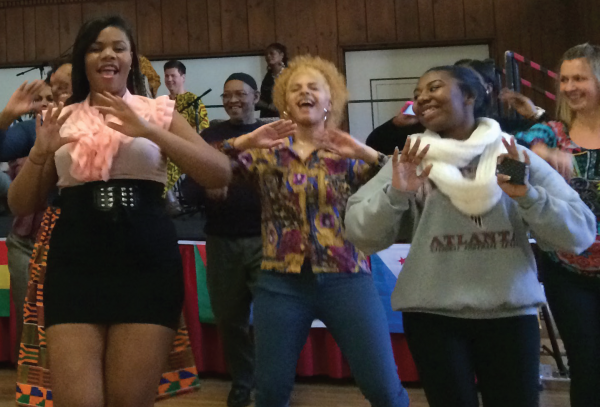

Photo Credit / Brittany Barnes
By Brittany Barnes
SC Staff Writer
“Black History Month is not a story of people who were once kings and queens in their native land, then suddenly thrust into the back of society. They never forgot where they came from; they never stopped trying to gain their freedom, their dignity, or their proper place in human society,” said Reverend Dr. James D. Jackson at the African American Heritage Festival on February 28.
The Office of Diversity, the Office of Multicultural Affairs, and the Student Activities Association sponsored the festival. It was lively, fun, and inspirational for all in attendance. There were people of all races and all ages that came out to celebrate black history.
The flyer stated the event would have much more to offer than a bland ceremony; it did not fall short.
Prior to the opening ceremony, the festival showcased student art, which included a drawing of a young man holding a “don’t shoot” sign.
There was also a board displaying photographs of black students holding signs in memory of black lives taken unjustly. Some names included Emmett Till, Eric Garner, and Trayvon Martin.
Local and campus vendors attended to show their work and promote their businesses. Alternative Salon, located on Main Street, showcased their business by styling a woman’s hair.
The ceremony began with the singing of the “Black National Anthem” led by ESU student Brittney Rollerson.
Following the anthem, Student Senate President Drew Johnson introduced Dr. Jackson.
Dr. Jackson’s speech as a whole was uplifting, thought provoking, and powerful. “Moveable Chain” is a term Dr. Jackson used throughout his speech to explain American society and the troubles all people, not just black people, face when trying to move up in society.
To get more of an understanding of the term, Dr. Jackson told the audience a story: “During the (bus) boycott, there was something called the in-between space. It was a space where African American’s could sit close to the white section but if the bus filled up, they were forced to move to the back.”
There was a chain that separated the sections, but the chain was constantly being moved, which in turn constantly moved the in-between space. He went on to use this metaphor to describe the battle Americans endure struggling to get to the front of society or even “in between” society.
“If we all call ourselves American, there is a need to understand that Black History Month is not about the front of society or the back of society, and it’s not even about the space in between. No, it’s about the moveable chain,” Dr. Jackson declared.
He explained how people of power are able to move this chain whenever they please, making it hard for anyone in the back or in between to move forward.
He said, “Black History Month is about remembering and discovering the stories of people who, in spite of that moveable chain, never stopped running for their freedom.”
After Dr. Jackson’s speech and a brief break for food, Maxwell Kofi Donkor’s Drum and Dance Ensemble came on to perform for the remainder of the festival.
Kofi, the lead drummer, gave a brief speech, stating, “You are unique as a person; you have something to offer the world.”
He stressed the importance of drumming and dancing to the audience before he and his ensemble continued. Everyone was dancing in their seats, and some even got up in front and danced along with the dancers. The drumming and dancing was amusing and very enjoyable. Everyone was having fun.
Kofi said, “I did not ask to be born in Africa, just as you did not ask to be born in America. I did not ask to be black and neither did you; our blood is the same.”
It doesn’t matter what race you are, what religion you identify with, or your sexual orientation.
At the end of the festival, a speaker came up to recite Maya Angelou’s “Still I Rise.”
When you thought the event was over, a student, Stephon Seawright, offered to read his poem, titled “I Am a Black Man.”
The poem intended to uplift black people, especially black men, against what society may perceive them as. It spread the message to be proud of who you are despite the judgments of the people around you.
The festival had a theme of unity in all of the presenters and speakers. Dr. Jackson stated multiple times that we are brothers and sisters.
Dr. Jackson stated, “I truly mean you are my brothers and my sisters.”
He stressed this throughout his speech because none of us are immune to that moveable chain.
Email Brittany at:
bbarnes1@live.esu.edu
